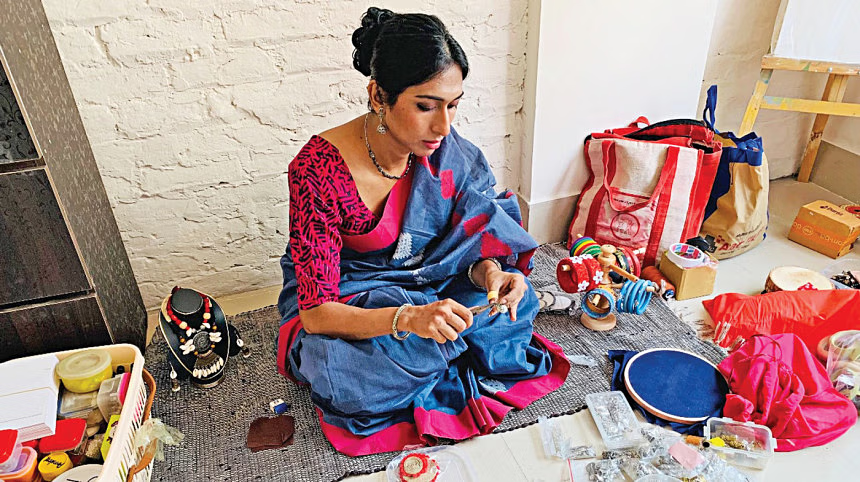December 9, 2024
DHAKA – Life has never been easy for Avaa Muskan Tithi. However, a fateful day in 2022 made things worse.
During her nursing internship at Suhrawardy Hospital in Dhaka, as she entered a ward, a patient noticed her hijra identity.
He started shouting, “Hijras kill people with injections.” He demanded Tithi be removed from there.
That moment was not just humiliating; it was an awakening for Tithi, forcing her to rethink her future in the service sector.
“Will I ever be accepted for who I truly am?” she wondered.
Meanwhile, she was forced to leave her family during the training, as her father couldn’t accept her identity.
Yet, Tithi channelled her pain into purpose.

PHOTO: THE DAILY STAR
Drawing on the artistic and sewing skills she inherited from her mother, she launched her own business, creating a Facebook page called “Chondrolota.”
With just Tk 2,000 and two saris, she stepped into the world of entrepreneurship.
However, the journey has been anything but smooth, with countless obstacles — no financial safety nets, no institutional support, no access to traditional loans, and no opportunities for professional training.
For her, this endeavour is not just about business; it’s about asserting her right in the unjust world.
Currently, Tithi sells a variety of handcrafted items online and offline, including patchwork bags, tote bags, upcycled bags, patchwork saris, hand-stitched saris, block-printed saris, and handmade jewellery.
She has recently focused on participating in fairs to showcase her products, as she lacks the necessary funds for online promotion and operations.
“Funding has always been a significant hurdle for me,” Tithi shared. “I’m unsure where to seek loans for my business, what the eligibility requirements are, or whether I even qualify for them.”
She received two small grants from Bandhu Social Welfare Society, an organisation dedicated to the welfare of hijras and marginalised communities.
“I had to buy a sewing machine, leaving me with little for other supplies. I can’t introduce new products to keep the business going, as I’m worried about incurring losses. I also lack the funds for online promotions.”
Participating in offline fairs also presented its own challenges.
“I remember taking a stall at a fair in Dhanmondi, where I couldn’t make a single sale,” she recounted.
“People would come and surf through my products, but no one bought anything. Some even filmed me from a distance, showing more interest in me than in my creations.”
Finding someone to share a stall with her has also proven difficult, as other entrepreneurs often hesitate. “They tell me directly that customers might not visit if they share a stall with me,” she explained.
This forces her to pay the full amount for a stall, despite it not being profitable given the limited sales potential in such a short time.
“It was evident that when I wasn’t at the stall, my products received a much better response, but hiring someone isn’t profitable for me due to my small business size.”
However, despite the setbacks, she found moments of success.
“There were times I did make a good profit from people who appreciated my art, like at Dhaka Makers and Art Summit.”
Unfortunately, similar issues sometimes plagued her online sales. When delivering products nearby, customers would stop her to ask irrelevant and inappropriate questions about her body.
Tithi has also been harassed multiple times while sourcing materials for her business.
In the male-dominated wholesale market in Islampur, she is often met with stares.
“On one occasion, I found a man putting his hand inside my jacket. When I looked at him, he smiled unapologetically and mockingly said, ‘Sorry.'”
Tithi also said she is frequently overcharged for the same materials compared to her peers from other genders.
Tithi often hauls 50 kg sacks of cloth down four flights of stairs, encountering refusals to assist her due to her hijra identity, even when she offers payment for help.
“In New Market, wholesale shopkeepers typically prioritise female entrepreneurs, engaging them in conversation and offering business tips, while I’m largely overlooked and spend entire days trying to buy just Tk 10,000 worth of products.”
Currently, Tithi’s average monthly income is Tk 15,000, constrained by inconsistent online sales. Last month, she earned around Tk 20,000 from selling a few saris and a shipment of patchwork bags to Japan.
Tithi believes hijra entrepreneurs could thrive if the government created a supportive environment, offering access to fairs, loans, and skills training. “Those without formal education should be given vocational training and job opportunities.”
However, she finds existing social welfare programmes to be mostly token gestures.
“For instance, a cooking course I attended was rushed and lacked substance, intended mainly for donor optics rather than real skill-building.”
She also said ICT sector courses overlook hijra individuals, who genuinely need these skills to succeed in the digital space.
Despite all, Tithi aspires to grow as an entrepreneur and proudly represent her identity.
“Many hijra entrepreneurs hide their identities, even while producing for top brands. I want to change that narrative and help train others in my community,” she said.
Her appeal to the new government is clear — fulfil the promise of anti-discrimination by providing hijras with genuine opportunities to work and thrive based on qualifications and expertise.


